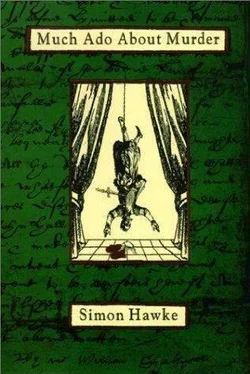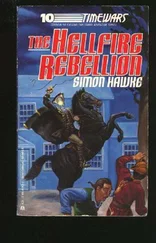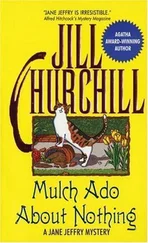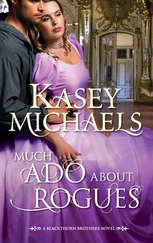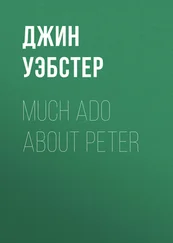Simon Hawke - Much Ado About Murder
Здесь есть возможность читать онлайн «Simon Hawke - Much Ado About Murder» весь текст электронной книги совершенно бесплатно (целиком полную версию без сокращений). В некоторых случаях можно слушать аудио, скачать через торрент в формате fb2 и присутствует краткое содержание. Жанр: Исторический детектив, на английском языке. Описание произведения, (предисловие) а так же отзывы посетителей доступны на портале библиотеки ЛибКат.
- Название:Much Ado About Murder
- Автор:
- Жанр:
- Год:неизвестен
- ISBN:нет данных
- Рейтинг книги:5 / 5. Голосов: 1
-
Избранное:Добавить в избранное
- Отзывы:
-
Ваша оценка:
- 100
- 1
- 2
- 3
- 4
- 5
Much Ado About Murder: краткое содержание, описание и аннотация
Предлагаем к чтению аннотацию, описание, краткое содержание или предисловие (зависит от того, что написал сам автор книги «Much Ado About Murder»). Если вы не нашли необходимую информацию о книге — напишите в комментариях, мы постараемся отыскать её.
Much Ado About Murder — читать онлайн бесплатно полную книгу (весь текст) целиком
Ниже представлен текст книги, разбитый по страницам. Система сохранения места последней прочитанной страницы, позволяет с удобством читать онлайн бесплатно книгу «Much Ado About Murder», без необходимости каждый раз заново искать на чём Вы остановились. Поставьте закладку, и сможете в любой момент перейти на страницу, на которой закончили чтение.
Интервал:
Закладка:
Smythe did not know what the answer was. Some of the hired men had already given up and found other employment, which was in itself no easy task these days. The city was teeming with people from the country, desperate for work of any kind, and with the shortage of jobs and housing, crime was on the increase. Ministers were preaching sermons from their pulpits in which they not only spoke out against the evils of crime, but also sought to advise the members of their congregations how to avoid being victimized. And if Robert Greene was no longer able to write plays successfully, or even sell his poetry, he was finding a new and thriving market for his cautionary pamphleteering. Even Shakespeare, whose passion for writing plays burned more brightly than the candle flames with which he illuminated his dogged efforts late into the night, was making his money elsewhere, selling laudatory poems to foppish noblemen. He was not too proud. He had a family in Stratford to support, not to mention helping out his fellow players.
For his own part, Smythe knew that his connection to the theatrical world was rather tenuous, at best. He had no illusions about what he could offer to the Queen’s Men. Much as he was loath to admit it, he had no talent as an actor. It was a constant struggle to remember the few lines he was given, and though he felt that he was making some slight improvements in that regard, those few lines were doled out grudgingly and more and more sparingly as time went on. More often than not, he was nothing more than a mere spear carrier. His value to the company was primarily for the strength of his limbs and his skills as a blacksmith and farrier. He was constantly repairing things, or else lifting heavy objects, or ejecting troublemakers and seeing to the horses and making sure the ostlers did their jobs properly during the performances. He had been promoted, in a sense, from a mere ostler to a sort of general, all-around hired man, a sort of apprentice stage manager, but his acting responsibilities were still slight compared to all the others. To some extent, he provided a visual appeal that Shakespeare had termed “stage-dressing.” Will had told him, trying to be reassuring and supportive, that it was always good to have some good-looking bodies on the stage and, regretably, there were few good-looking bodies left among the Queen’s Men. Somehow, Smythe had not felt very reassured to know that he was valued more for his brawn than for his brains.
On the other hand, Liam Bailey believed he had a future as a craftsman. While not quite openly contemptuous of his job with the Queen’s Men, Liam merely shook his head anytime Smythe mentioned it. The burly old smith was not unsympathetic. He understood, at least, what it meant to have a dream. In that, he reminded Smythe of his beloved Uncle Thomas.
The two men had much in common, Smythe thought, as he made his way to Liam Bailey’s smithy. They were both simple and plainspoken men, honest and direct, who enjoyed their work and believed in doing it well and charging for it fairly. But where Thomas Smythe supported his nephew and urged him to follow his dream if that was what he truly wanted, Liam Bailey had no such avuncular disposition and believed in simply saying what he thought. And what he thought was that Smythe was wasting his time working as a player when he could make an honest, useful living as a smith.
Liam Bailey was already busy working at his forge when Smythe arrived. Though it was a cool morning, he was shirtless, wearing only breeches and his well-worn brown leather apron, which was covered with dark singe marks. His torso glistened with a sheen of honest sweat. The curly hairs on his chest and arms were gray and white, giving him something of a bearish aspect, and his grizzled hair was cropped close to his skull, as usual. Few men wore their hair so short, unless they were completely bald, in which case they usually wore wigs, but Liam found long hair both a hazard and a distraction in his work and so he kept it shorn. For an old man, he was in remarkable condition, with a strong, thick chest and big, heavily muscled arms that easily swung sledgehammers that a lot of men would have difficulty even lifting.
He had never even once been to a complete performance at a playhouse, which was a point of pride with him. He understood what plays were all about, of course, and had a general idea of what it was like to see one in a playhouse, for on several occasions he had been called upon to do some work at inns were plays were being performed. He came away with little regard for what he called “the silly posturings and prating noise” of players.
“Aye, not for me, lad,” he said, when Smythe brought up the question as they worked together at the forge. “Never have I been to a gaming house, nor a bawdy house, neither. I see no purpose in such things. I work hard for my money, so why risk it in a foolish game of chance? Especially when chance plays so little part in it these days. Those gaming houses are all full o’ cheats an’ tricksters just waitin’ for a nice, fat cony to come along that they can skin. An’ as for bawdy houses, even if you do not come away poxed or lice-ridden from some doxy, or knocked over the head and get all your money taken away for bein’ a damn fool, a moment’s pleasure is scarce worth hours’ work, if you ask me. An’ for that matter, why sup from an unwashed trencher that’s already fed dozens more afore you?”
“And what of other entertainments?” Smythe had asked him with a smile, as he worked the bellows.
“Such as what? Baiting bears or bulls or apes, you mean, as they do down at the Paris Garden? Now what offense did a bear or bull or ape ever do to me that I should revel in the torture of the poor, dumb beast? Or go to a good execution, perhaps, eh? Now there’s a splendid evening’s entertainment! Watching some poor and misbegotten wretch have his guts pulled out, or else witness a hanging, or perhaps a whipping? One could always go and abuse some poor sod stuck in the pillory, that might be a pleasant way to pass the afternoon.” He snorted with derision. “Such diversions hold little interest for me.”
“There are other, less violent ways to entertain oneself, you know,” said Smythe. “Have you never gone to Paul’s and bought a book? Or just taken in the sights?”
“Aye, once.”
“Only once? Twasn’t to your liking, then?”
Liam Bailey’s jaw muscles tightened. “A church is a place for prayin’, not for sellin’ things. If the Lord Jesus were to come back and pay a visit to St. Paul’s, why he would drive the blackguards out as he drove out the moneylenders from the temple! An’ he would call back the crowd that wished to stone the harlot and have them bury all the bastards in a rain of rocks. ‘Tis a disgrace what they have brought that goodly cathedral to, if you ask me. ‘Tis supposed to be the house of God, and yet, all manner of sin is found transacted there each day.”
“Have a care, Liam. You are sounding just a wee bit like a Papist,” Smythe said, with a chuckle.
“It need not take a Roman Pope to see that churches in this land have fallen to a sorry state,” the grizzled old smith replied. “Far be it from me to claim that I could know God or understand His will, but I cannot believe that havin’ whores sellin’ themselves in church was what He had in mind.”
“Well, I suppose Paul’s Walk is out, then. What about music and dancing, then? Do you enjoy that?”
“I am Irish. Of course I enjoy music. And I might indulge in a jig or two every now and then, but I am not much of a dancer. Too big and clumsy. And too old.”
“Oh, I do not believe that for a moment,” said Smythe, with a chuckle. “I would bet that you could dance long after most men half your age have dropped from weariness. And singing. I have heard you sing a time or two, whilst you are working. You have a fine, baritone voice.”
Читать дальшеИнтервал:
Закладка:
Похожие книги на «Much Ado About Murder»
Представляем Вашему вниманию похожие книги на «Much Ado About Murder» списком для выбора. Мы отобрали схожую по названию и смыслу литературу в надежде предоставить читателям больше вариантов отыскать новые, интересные, ещё непрочитанные произведения.
Обсуждение, отзывы о книге «Much Ado About Murder» и просто собственные мнения читателей. Оставьте ваши комментарии, напишите, что Вы думаете о произведении, его смысле или главных героях. Укажите что конкретно понравилось, а что нет, и почему Вы так считаете.
